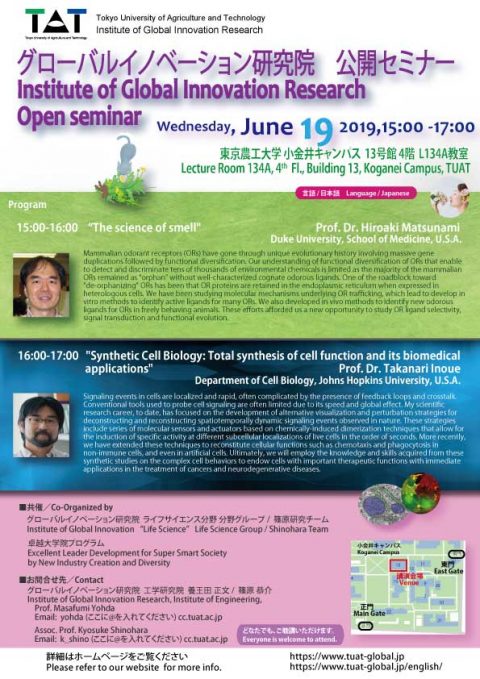Event
【GIR Open Seminar】Dr. Hiroaki Matsunami / Dr. Takanari Inoue

| Date | 2019.6.19 (15:00 - 17:00) |
|---|---|
| Venue |
Lecture Room 134A, 4th Fl., Building 13, Koganei Campus, TUAT |
| Title | 15:00~16:00 Prof. Dr. Hiroaki Matsunami (Duke University, School of Medicine, U.S.A.) “The science of smell" 〈Abstruct〉 Mammalian odorant receptors (ORs) have gone through unique evolutionary history involving massive gene duplications followed by functional diversification. Our understanding of functional diversification of ORs that enable to detect and discriminate tens of thousands of environmental chemicals is limited as the majority of the mammalian ORs remained as “orphan” without well-characterized cognate odorous ligands. One of the roadblock toward “de-orphanizing” ORs has been that OR proteins are retained in the endoplasmic reticulum when expressed in heterologous cells. We have been studying molecular mechanisms underlying OR trafficking, which lead to develop in vitro methods to identify active ligands for many ORs. We also developed in vivo methods to identify new odorous ligands for ORs in freely behaving animals. These efforts afforded us a new opportunity to study OR ligand selectivity, signal transduction and functional evolution. 16:00~17:00 Prof. Dr. Takanari Inoue "Synthetic Cell Biology: Total synthesis of cell function and its biomedical applications" 〈Abstruct〉 Signaling events in cells are localized and rapid, often complicated by the presence of feedback loops and crosstalk. Conventional tools used to probe cell signaling are often limited due to its speed and global effect. My scientific research career, to date, has focused on the development of alternative visualization and perturbation strategies for deconstructing and reconstructing spatiotemporally dynamic signaling events observed in nature. These strategies include series of molecular sensors and actuators based on chemically-induced dimerization techniques that allow for the induction of specific activity at different subcellular localizations of live cells in the order of seconds. More recently, we have extended these techniques to reconstitute cellular functions such as chemotaxis and phagocytosis in non-immune cells, and even in artificial cells. Ultimately, we will employ the knowledge and skills acquired from these synthetic studies on the complex cell behaviors to endow cells with important therapeutic functions with immediate applications in the treatment of cancers and neurodegenerative diseases. |
| Language | English |
| Intended for | Everyone is welcome to attend. |
| Co-Organized by | Institute of Global Innovation Research “Life Science” Shinohara Team Excellent Leader Development for Super Smart Society by New Industry Creation and Diversity |
| Outline | |
| Contact | Institute of Global Innovation Research ●Prof. Masafumi Yohda Email: yohda (at) cc.tuat.ac.jp ●Assoc. Prof. Kyosuke Shinohara Email: k_shino (at) cc.tuat.ac.jp |
このページの上部へ